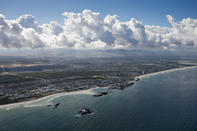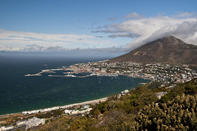Natural State of Flux

The Cape coast is in a natural state of flux: pounding storms; waves and wind perpetually sweeping sand back and forth; the steady melting away of dunes to erosion, and the rebuilding of them elsewhere. These are the natural sculpting processes of a healthy, functioning coastline, especially one as ‘energetic’ as Cape Town’s. These forces have reshaped river mouths, redrawn beaches, inundated the flats with water and seen it recede again. Sometimes this change happens over a single season, sometimes over decades, sometimes over thousands of years.
Changing ocean behaviour in response to rising global temperatures caused by human activities on the planet will make these natural ocean and wind forces much stronger and faster, causing them to act with greater power on our coastline. This puts coastal dwellings and developments at additional risk.
We are learning that it is better to work with nature’s forces, rather than against them. This is particularly true as human impacts on Earth’s atmosphere have knockon effects on our oceans, which in turn put our settled coastlines at risk. A coastline is a valuable thing, and everyone wants their piece of it.
In Cape Town, the coast is the gateway to historic fishing grounds. It is where fynbos-clad mountain slopes meet some of the most beautiful beaches and tidal pools in the world.
History of Development

People have used the Cape Peninsula and surrounds for hundreds of thousands of years. More recently, as increasing numbers of people have settled here permanently, we’ve tried to lock down the forces of movement for our convenience, safety or protection. We’ve thrown down concrete slabs, put up massive buildings, pushed back the tide to claim the seabed for development, rolled out kilometres of tar roads and rail lines.
Development often restricts nature’s inbuilt movement, trapping the city into highly engineered spaces that have lost their resilience in the face of nature’s constant change. The spreading urban edge has undermined nature’s buffers which help absorb the damaging impacts of storm surges and violent seas.